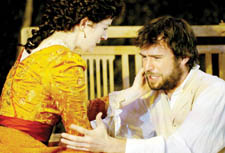 |
A landmark of the revolution
ENEMIES
Alexandra Theatre
MAXIM Gorky – writer, revolutionary – was a lifelong champion of the poor and underprivileged.
Friend to Leo Tolstoy and Anton Chekhov, he edited the Russian newspaper Pravda and was involved in an armed uprising in 1905. Born into a peasant family, he would move in high circles as his literary career took off. For all his life Gorky – who many believe was assassinated on Joseph Stalin’s orders – was driven by his belief in the success of the revolution. His play, Enemies, mirrors the uprisings among workers in factories in 1905. If there was ever a truthful draft of history, this is it.
The compassionate factory owner Zakhar Bardin (Sean Chapman) comes into conflict with the authoritarian supervisor Mikhail Skrobotov (Sean Gilder). Skrobotov has run a tight shop, using fear to keep his workers in check. Bardin wants to play the nice boss and cuts the workers some slack. His new approach spells doom for Skrobotov early on, whose murder ruptures bonds in the aristocracy and fires a mutiny from the factory workers.
But for Gorky, social divisions were not as simple as ‘us against them’.
Written in 1907 – here adapted by David Hare of
Permanent Way fame – the play was the first to represent workers as a class of individuals, unlike the rounded mob, or masses, depicted in Shakespeare’s Coriolanus or Henry VI for example.
In the vast 24-strong cast, the factory workers equal the bourgeoisie in number and individual eccentricity.
This landmark script owes much to the political philosophy of Gorky’s close friend Lenin who wrote about the practical uses of literature in the revolutionary movement, about the “heightening of consciousness and individuality”.
He believed Gorky’s works had awakened an individuality in the workers, but that did not mean they could be fashioned by the bourgeoisie.
He wrote: “What the worker will take from Shakespeare, Goethe, Pushkin or Dostoievsky, will be a more complex idea of human personality, of its passions and feelings, a deeper and profounder understanding of its psychic forces. In the final analysis, the worker will become richer.”
Lenin’s understanding of the potential of art permeates this excellent play, which is packed with outstanding individual performances that come together like a well-oiled machine.
Recommended.
Until June 24
020 7359 4404
|


